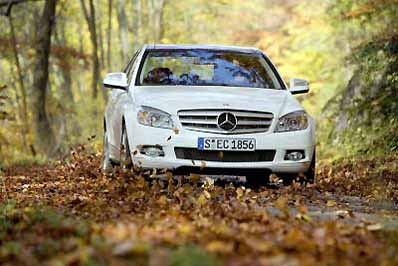
Fuel consumption
falls by up to 0.5 litres per 100 kilometres

Der Kraftstoffverbrauch sinkt um
bis zu 0,5 Liter je 100 Kilometer
ZUR DEUTSCHEN
VERSION |
Mercedes-Benz C-Class
In the C-Class
Mercedes-Benz is offering a new generation of all-wheel-drive 4MATIC, which
improves on previous all-wheel technology with higher efficiency, lower weight
and more compact design.
 In the C-Class Mercedes-Benz is offering a new
generation of all-wheel-drive 4MATIC, which improves on previous all-wheel
technology with higher efficiency, lower weight and more compact design.
These advantages versus its predecessor are reflected in even better traction
and more efficient fuel consumption of up to 0.5 litres per 100 kilometres.
The 4MATIC models are equipped with a seven-speed automatic gearbox as standard.
The newly developed Mercedes-Benz 4MATIC is permanently active and therefore
operates with no reaction time, assisting the driver in unfavourable weather
conditions such as rain, ice or snow. This enables him to manage critical
situations with confidence. The centrepiece of the all-wheel system is a
transfer case with a centre differential, which is integrated into the
seven-speed automatic transmission. From here the drive torque is distributed
to the front and rear axles in a 45:55 split. At just 60 to 70 kilograms
(depending on the model), the permanent all-wheel-drive developed by
Mercedes-Benz is the lightest transmission system of its kind. A newly developed
multi-disc clutch on the centre differential transfers the engine power to
all the wheels with a basic locking force of 50 newton metres between the
front and rear axles, so that the new C-Class moves off even better on slippery
road surfaces and has even greater driving stability than the preceding 4MATIC
models. As a standard feature Mercedes-Benz combines the permanent
all-wheel-drive with the ESP® Electronic Stability Program and the 4ETS
traction system, which selectively brakes wheels at the onset of wheelspin
thus increasing torque at the wheels with good traction. The system uses
sensor signals to measure out the automatic braking impulses, which improve
traction when driving on slippery surfaces and increase stability during
critical manoeuvres. In this way, 4ETS achieves the same effect as conventional
differential locks with appreciably greater comfort than other all-wheel-drive
cars. In the C-Class Mercedes-Benz is offering a new
generation of all-wheel-drive 4MATIC, which improves on previous all-wheel
technology with higher efficiency, lower weight and more compact design.
These advantages versus its predecessor are reflected in even better traction
and more efficient fuel consumption of up to 0.5 litres per 100 kilometres.
The 4MATIC models are equipped with a seven-speed automatic gearbox as standard.
The newly developed Mercedes-Benz 4MATIC is permanently active and therefore
operates with no reaction time, assisting the driver in unfavourable weather
conditions such as rain, ice or snow. This enables him to manage critical
situations with confidence. The centrepiece of the all-wheel system is a
transfer case with a centre differential, which is integrated into the
seven-speed automatic transmission. From here the drive torque is distributed
to the front and rear axles in a 45:55 split. At just 60 to 70 kilograms
(depending on the model), the permanent all-wheel-drive developed by
Mercedes-Benz is the lightest transmission system of its kind. A newly developed
multi-disc clutch on the centre differential transfers the engine power to
all the wheels with a basic locking force of 50 newton metres between the
front and rear axles, so that the new C-Class moves off even better on slippery
road surfaces and has even greater driving stability than the preceding 4MATIC
models. As a standard feature Mercedes-Benz combines the permanent
all-wheel-drive with the ESP® Electronic Stability Program and the 4ETS
traction system, which selectively brakes wheels at the onset of wheelspin
thus increasing torque at the wheels with good traction. The system uses
sensor signals to measure out the automatic braking impulses, which improve
traction when driving on slippery surfaces and increase stability during
critical manoeuvres. In this way, 4ETS achieves the same effect as conventional
differential locks with appreciably greater comfort than other all-wheel-drive
cars. |
Fuel consumption falls by up to 0.5 litres per
100 kilometres
High-torque six-cylinder engines are available for the 4MATIC models in the
C-Class. A diesel engine is also available for the first time. In saloons
Mercedes-Benz offers this permanent all-wheel-drive system in the C 280,
C 350 and C 320 CDI models; the C 320 CDI is available with 4MATIC as an
estate. With a 200 kW/272 hp six-cylinder engine the new C 350 4MATIC consumes
between 10.0 and 10.3 litres of premium petrol per 100 kilometres (combined
NEFC consumption), making it 0.3 litres more economical than its predecessor.
The C 280 4MATIC saves up to 0.5 litres of fuel per 100 kilometres. The new
C 320 CDI 4MATIC has an output of 165 kW/224 hp and the saloon version consumes
between 7.7 and 8.0 litres of fuel per 100 kilometres. Depending on the
motorization, this means that the all-wheel-drive system only increases
consumption from 0.2 to 0.4 litres per 100 kilometres. The 4MATIC saloons
offer the same, comprehensive safety and comfort features as the rear-wheel-drive
models. These include the AGILITY CONTROL package with selective shock absorber
control, as well as seven airbags, crash-responsive head restraints, automatic
climate control and alloy wheels. The 7G-TRONIC seven-speed automatic
transmission is also on board.
READER COMMENTS
Daimler Communications, 70546
Stuttgart, Germany
Mercedes-Benz – A Daimler Brand, December 2007 |
BACK TO TOP |
